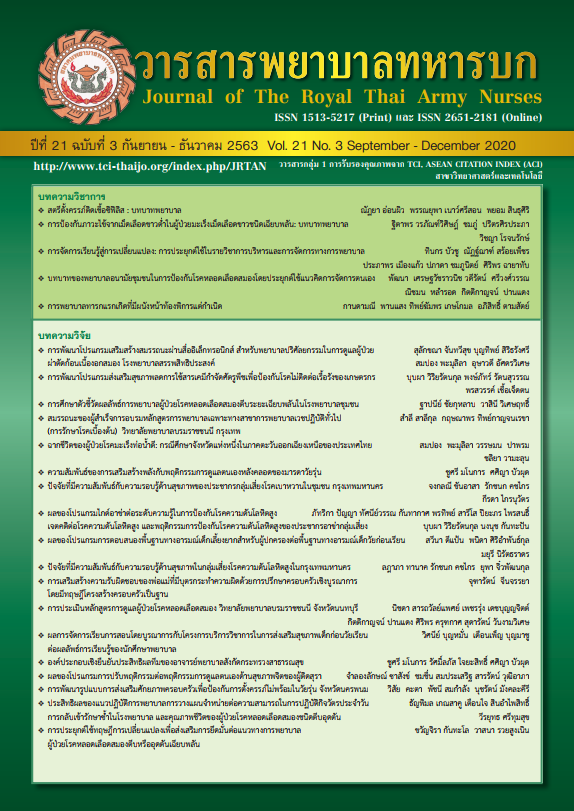The Effects of An Emotional Intelligence Development Program on The Impulsive Behavior of Junior High School Students in Extended Opportunity Education Schools in Bangkok
Keywords:
emotional intelligence, impulsive behavior, junior high school students, extended opportunity education schoolsAbstract
The purpose of this two-group pretest-posttest quasi-experimental study was to examine the effectiveness of an emotional intelligence development program on the impulsive behavior of junior high school students in extended opportunity education schools in Bangkok. One hundred and sixty-eight participants were randomized equally into the experimental and control groups (84 in each group). The experimental group received the emotional intelligence development program that was developed based on the Bar-On model of the emotional intelligence factors of impulse control, along with the Kolb model of experiential learning, for a period of 4 weeks, while the control group was treated normally. The research instruments were: 1) the emotional intelligence development program; 2) a general information questionnaire; and 3) the Barratt Impulsiveness Scale (BIS11) translated into Thai. The Cronbach’s alpha coefficient for the BIS-11 was .75. General data were analyzed using descriptive statistics, comparing the average impulsive behavior scores in the experimental group before and after the program using dependent t-test, and comparing the average impulsive behavior scores after the program between the experimental group and the control group with independent t-test.
After the experiment the average impulsive behavior score for the experimental group (M = 59.05, SD = 9.87) was lower than before the program (M = 68.18, SD = 6.08) and the control group (M = 69.57, SD = 5.365) at a statistical significance (p<.05).
Downloads
References
Rithakananone P. Human development [dissertation]. Bangkok: Chulalongkorn University; 2017. (in Thai)
Ministry of education. Policy of the office of the basic education commission. Bangkok: Policy of the office of the basic education; 2018. (in Thai)
Kaew-in K. Depression and behavior problems among adolescent in urban opportunity school under Sing Buri provincial office of primary education [dissertation]. Bangkok: Chulalongkorn University; 2002. (in Thai)
Katuman P. Textbook of child and adolescent psychiatry 2nd edition. Bangkok: Thana place; 2007. (in Thai)
Barratt ES, Stanford MS, Kent TA, Felthous A. Neuropsychological and cognitive psychophysiological substrates of impulsive aggression. Biol Psychiatry. 1997; 41(10): 1045–61.
Shannon BJ, Raichle ME, Snyder AZ, Fair DA, Mills KL, Zhang D, et al. Premotor functional connectivity predicts impulsivity in juvenile offenders. Proc Natl Acad Sci U S A. 2011; 108(27): 11241–5.
Chaffin M, Wherry JN, Dykman R. School age children’s coping with sexual abuse: Abuse stresses and symptoms associated with four coping strategies. Child abuse negl. 1997; 21(2): 227–40.
Wegmann L, Bühler A, Strunk M, Lang P, Nowak D. Smoking cessation with teenagers: The relationship between impulsivity, emotional problems, program retention and effectiveness. Addict behav. 2012; 37(4): 463–8.
Adams ZW, Milich R, Lynam DR, Charnigo RJ. Interactive effects of drinking history and impulsivity on college drinking. Addict Behav. 2013; 38(12): 2860–7.
Lockwood J, Daley D, Townsend E, Sayal K. Impulsivity and self-harm in adolescence: A systematic review. Child adolesc psychiatry. 2017; 26(4): 387–402.
Bar-On R. The Bar-On model of emotional-social intelligence. Psicothema. 2006; 18 Suppl: 13–25.
Poomsanguan K, Paikoh K. Nurses and development of emotional quotient. J R thai army nurses. 2014; 15(3): 18-23. (in Thai)
Coccaro EF, Fridberg DJ, Fanning JR, Grant JE, King AC, Lee R. Substance use disorders: Relationship with intermittent explosive disorder and with aggression, anger, and impulsivity. J Psychiatr Res. 2016; 81: 127–32.
Coccaro EF, Zagaja C, Chen P, Jacobson K. Relationships between perceived emotional intelligence, aggression, and impulsivity in a population-based adult sample. Psychiatry Res. 2016; 246: 255–60.
Lane SD, Cherek DR. Biological and behavioral investigation of aggression and impulsivity. Kingston, NJ, US: Civic Research Institute; 2000.
Kolb D. Experiential learning: experience as the source of learning and development. Journal of Business Ethics. 1984; (1).
Patton, Jim H, Stanford, Matthew S, Barratt, Ernest S. Factor structure of the Barratt impulsiveness scale. Journal of clinical psychology. 1995; 51: 768–74.
Makewilai J, Takviriyanun N, Vuthiarpa S. The effects of a cognitive-behavioral therapy program on the depression and impulsivity among adolescents in juvenile. J Nurs Heal Care. 2018; 36(1): 154-163. (in Thai)
Sripakho P, Phuphaibul R, Kongsaktrakul C. The effects of the life skills development program using cartoon books mediaon life skills among grade five students. J R Thai army nurses. 2013; 14(1): 71-84. (in Thai)
Egloff G, Djordjevic D. Egloff G, Djordjevic D. Pre- and postnatal psychosocial intervention concepts. Poster, 25th European Congress of Psychiatry; 2017 April 1-4; Florence; 2017.
Russell B, Thompson Heller A, Hutchison M. Differences in adolescent emotion regulation and impulsivity: A group comparison study of school-based recovery students. Substance use & misuse. 2017; 52(8): 1–13.
Phuipha T, Bunthumporn N, Vuthiarpa S. The effect of a life-skill training program on the depressive symptoms of senior high school students. J R Thai army nurses. 2018; 19 (Supplement): 89-98. (in Thai)
Zapolski TCB, Smith GT. Pilot study: Implementing a brief DBT skills program in schools to reduce health risk behaviors among early adolescents. J Sch Nurs. 2016; 33(3): 198–204.
Castillo R, Salguero JM, Fernandez-Berrocal P, Balluerka N. Effects of an emotional intelligence intervention on aggression and empathy among adolescents. J Adolesc. 2013; 36(5): 883–92
Downloads
Published
How to Cite
Issue
Section
License
บทความหรือข้อคิดเห็นใดใดที่ปรากฏในวารสารพยาบาลทหารบกเป็นวรรณกรรมของผู้เขียน ซึ่งบรรณาธิการหรือสมาคมพยาบาลทหารบก ไม่จำเป็นต้องเห็นด้วย
บทความที่ได้รับการตีพิมพ์เป็นลิขสิทธิ์ของวารสารพยาบาลทหารบก
The ideas and opinions expressed in the Journal of The Royal Thai Army Nurses are those of the authors and not necessarily those
of the editor or Royal Thai Army Nurses Association.






